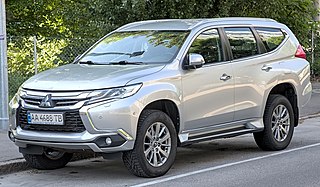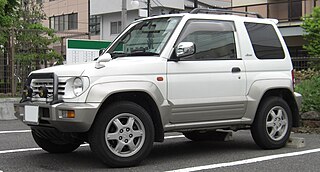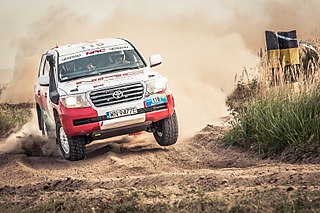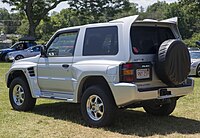
The Dakar Rally or simply "The Dakar", formerly known as the "Paris–Dakar Rally", is an annual rally raid organised by the Amaury Sport Organisation. Most events since the inception in 1978 were staged from Paris, France, to Dakar, Senegal. Security threats in Mauritania led to the cancellation of the 2008 rally, and events from 2009 to 2019 were held in South America. Since 2020, the rally has been held in Saudi Arabia. The event is open to amateur and professional entries, professionals typically making up about eighty percent of the participants.

Mitsubishi Motors Corporation is a Japanese multinational automobile manufacturer headquartered in Minato, Tokyo, Japan. In 2011, Mitsubishi Motors was the sixth-largest Japanese automaker and the 19th-largest worldwide by production. Since October 2016, Mitsubishi has been one-third (34%) owned by Nissan, and included in the Renault–Nissan–Mitsubishi Alliance.

The Mitsubishi Lancer Evolution, popularly referred to as the 'Evo', is a sports sedan and rally car based on the Lancer that was manufactured by Japanese manufacturer Mitsubishi Motors from 1992 until 2016. There have been ten official versions to date, and the designation of each model is most commonly a Roman numeral. All generations use two-litre intercooled turbo inline four-cylinder engines and all-wheel drive systems.

The Volkswagen Touareg is a car produced by German automaker Volkswagen Group since 2002 at the Volkswagen Bratislava Plant. Considered the first luxury mid-size crossover SUV by Volkswagen, the vehicle is named after the nomadic Tuareg people, inhabitants of the Saharan interior in North Africa. The Touareg was originally developed with the Porsche Cayenne and Audi Q7 and as of October 2020, the Touareg was developed with the Audi Q8, the Bentley Bentayga and the Lamborghini Urus. The first generation (2002–2010) offered five, six, eight, ten and twelve-cylinder engine choices.

Group A is a set of motorsport regulations administered by the FIA covering production derived touring cars for competition, usually in touring car racing and rallying. In contrast to the short-lived Group B and Group C, Group A vehicles were limited in terms of power, weight, allowed technology and overall cost. Group A was aimed at ensuring numerous entries in races of privately owned vehicles.

The Mitsubishi Pajero Sport is a body-on-frame mid-size SUV produced by the Japanese manufacturer Mitsubishi Motors using the Pajero nameplate since 1996. Based on the Triton pickup truck, the Pajero Sport has spanned over three generations. It is unrelated to the full-size Pajero, which is built on a unibody chassis since 1999 and was discontinued in 2021.

The Mitsubishi Pajero is a full-size SUV manufactured and marketed globally by Mitsubishi over four generations — introduced in 1981 and discontinued in 2021.
Ralliart is the high-performance division of Mitsubishi Motors. It was responsible for development and preparation of the company's rally development of high-performance models and parts available to the public. Ralliart scaled down its business activities in April 2010, though the brand will continue to be used by Mitsubishi.

The Mitsubishi Galant VR-4 was the range-topping version of Mitsubishi Motors' Galant model, available in the sixth (1987–1992), seventh (1992–1996) and eighth (1996–2002) generations of the vehicle. Originally introduced to comply with the new Group A regulations of the World Rally Championship, it was soon superseded as Mitsubishi's competition vehicle by the Lancer Evolution, and subsequently developed into a high-performance showcase of the company's technology.

The Mitsubishi Pajero Junior is a mini SUV produced by Japanese automaker Mitsubishi Motors between October 1995 and March 1998 for the Japanese domestic market only. Based on a lengthened Minica platform, it was a larger version of the Mitsubishi Pajero Mini, a kei car. The biggest visual difference from the Pajero Mini is the wide fender trims and wider tyres, giving it a more purposeful appearance. The car is classified as a small size car according to Japanese government dimension regulations, so it pays lower taxes than the normal-size Pajero but higher taxes than the Pajero Mini.

The Mitsubishi Nessie is a concept automobile co-developed by Italdesign Giugiaro, The Linde Group and Mitsubishi Motors, and exhibited at the 2005 Geneva Auto Show. It is the latest in a line of SUVs, space-wagons and alternative architectures designed by Giugiaro dating back to 1978 and the Lancia Megagamma, with more recent examples including the Giugiaro Touareg (2002), Maserati Kubang (2003) and Volkswagen Tarek (2003).
All Wheel Control (AWC) is the brand name of a four-wheel drive (4WD) system developed by Mitsubishi Motors. The system was first incorporated in the 2001 Lancer Evolution VII. Subsequent developments have led to S-AWC (Super All Wheel Control), developed specifically for the new 2007 Lancer Evolution. The system is referred by the company as its unique 4-wheel drive technology umbrella, cultivated through its motor sports activities and long history in rallying spanning almost half a century.

The Mitsubishi Colt 800 is the first of a series of passenger cars with a fastback/hatchback design produced by Mitsubishi Motors from November 1965. It was introduced as a two-door fastback sedan, the first such design in the Japanese market. The series was discontinued in 1971, after the introduction of the company's Galant sedan but without a real replacement.

The 2006 Dakar Rally, also known as the 2006 Paris-Dakar Rally, was the 28th running of the Dakar Rally event. The 2006 event ran from 31 December 2005 to 15 January 2006. It started from Lisbon, Portugal, and passed through Spain, Morocco, Western Sahara, Mali, Mauritania, Guinea, before finishing in Senegal. The format included speed restrictions on motorcycles and trucks and reduced use of global positioning systems. Competitors included double world rally champion, Carlos Sainz.

The Mitsubishi Lancer WRC is a World Rally Car built by Ralliart, Mitsubishi Motors' motorsport division, to compete in the World Rally Championship. The previous Lancer Evolution series were homologated for the Group A class, and their competitiveness against World Rally Cars from other manufacturers was therefore limited.

The Mitsubishi Eclipse Cross is a compact crossover SUV produced by Japanese automaker Mitsubishi Motors since October 2017. It was previewed by the XR-PHEV and XR-PHEV II concepts, revealed in 2013 and 2015. The production version was first introduced at the 87th Geneva Motor Show in March 2017. It slots between the RVR/ASX/Outlander Sport and Outlander in Mitsubishi's crossover lineup.

Cristina Gutiérrez Herrero is a Spanish dentist and rally raid driver. She became the first Spanish female car driver to finish the Dakar Rally in 2017 before winning the event in the T3 category in 2024. In 2021 she was the second woman to win a stage in Dakar Rally history. She participates in the Extreme E electric cross-country series, driving for Lewis Hamilton's Team X44. In 2021 she won the FIA World Cup for Cross-Country Rallies, becoming the first-ever female driver to win the FIA World Cup for Cross-Country Rallies. In 2022 she won the Extreme-E Championship alongside Sébastien Loeb in Lewis Hamilton's Team X44, making her the first Spanish woman to ever win it. In 2022 she was the first Spanish female to reach the podium of the Dakar Rally, being the third classified in the T3 category. In 2023 Dakar Rally she finished in 4th position after having many issues in the first week that prevented her from fighting for the victory. Nonetheless, she won the prologue of the Dakar Rally and the last stage which allowed her to finish in 4th position. In 2024, Cristina made history by winning the challenger category in the Dakar Rally, becoming only the second woman in history to achieve this feat in the world's toughest rally. This accomplishment follows Jutta Kleinschmidt victory in 2001, 23 years prior, as the Dakar Rally continues to become more and more professionalized. She is also the first Spanish woman to ever win at the Dakar Rally. She also holds four Dakar Rally stage wins.

Mitsubishi Motors Brasil, known officially as MMC Automóveis do Brasil Ltda., is the Brazilian operation of Mitsubishi Motors. Since its inauguration, it has sold more than 200 thousand vehicles in Brazil and now has an annual turnover of around R$ 4 billion, being one of the 100 largest companies in the country.

In relation to motorsport, Group T2 is a set of technical specifications for series production cross-country cars used in off-road Cross-Country Rallying. The group is governed by the Fédération Internationale de l'Automobile (FIA) and defined in appendix J, article 284 of its International Sporting Code. The cars must use a bodyshell and apart from safety features such as a roll cage and upgraded suspension and wheels, must retain features of the series production car unlike the thoroughbred race prototypes in Group T1, which have more freedom surrounding the chassis build and other parts. The cars in T2 must be homologated with a series production build requirement of 1000 identical units.


















